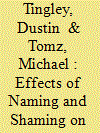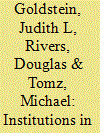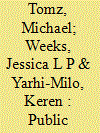|
|
|
Sort Order |
|
|
|
Items / Page
|
|
|
|
|
|
|
| Srl | Item |
| 1 |
ID:
186192


|
|
|
|
|
| Summary/Abstract |
How does naming and shaming affect public support for compliance with international agreements? We investigated this question by conducting survey experiments about the Paris Agreement, which relies on social pressure for enforcement. Our experiments, administered to national samples in the United States, produced three sets of findings. First, shaming by foreign countries shifted domestic public opinion in favor of compliance, increasing the political incentive to honor the Paris Agreement. Second, the effects of shaming varied with the behavior of the target. Shaming was more effective against partial compliers than against targets that took no action or honored their obligations completely. Moreover, even partial compliers managed to reduce the effects of shaming through the strategic use of counter-rhetoric. Third, identity moderated responses to shaming. Shaming by allies was not significantly more effective than shaming by non-allies, but Democrats were more receptive to shaming than Republicans. Overall, our experiments expose both the power and the limits of shaming as a strategy for enforcing the Paris Agreement. At the same time, they advance our understanding of the most significant environmental problem facing the planet.
|
|
|
|
|
|
|
|
|
|
|
|
|
|
|
|
| 2 |
ID:
090833


|
|
|
|
|
| Publication |
2009.
|
| Summary/Abstract |
Candidates often make ambiguous statements about the policies they intend to pursue. In theory, ambiguity affects how voters make choices and who wins elections. In practice, measurement and endogeneity problems have impeded empirical research about the consequences of ambiguity. We conducted survey experiments that overcame these obstacles by manipulating a common form of ambiguity: the imprecision of candidate positions. Our data show that, on average, ambiguity does not repel and may, in fact, attract voters. In nonpartisan settings, voters who have neutral or positive attitudes toward risk, or who feel uncertain about their own policy preferences, tend to embrace ambiguity. In partisan settings, voters respond even more positively to ambiguity; they optimistically perceive the locations of ambiguous candidates from their own party without pessimistically perceiving the locations of vague candidates from the opposition. We further find, through analysis of two additional new data sets, that candidates often take-and voters frequently perceive-ambiguous positions like the ones in our experiments. The pervasive use of ambiguity in campaigns fits with our experimental finding that ambiguity can be a winning strategy, especially in partisan elections.
|
|
|
|
|
|
|
|
|
|
|
|
|
|
|
|
| 3 |
ID:
077292


|
|
|
|
|
| Publication |
2007.
|
| Summary/Abstract |
The General Agreement on Tariffs and Trade (GATT) and the World Trade Organization (WTO) have been touted as premier examples of international institutions, but few studies have offered empirical proof. This article comprehensively evaluates the effects of the GATT/WTO and other trade agreements since World War II. Our analysis is organized around two factors: institutional standing and institutional embeddedness. We show that many countries had rights and obligations, or institutional standing, in the GATT/WTO even though they were not formal members of the agreement. We also expand the analysis to include a range of other commercial agreements that were embedded with the GATT/WTO. Using data on dyadic trade since 1946, we demonstrate that the GATT/WTO substantially increased trade for countries with institutional standing, and that other embedded agreements had similarly positive effects. Moreover, our evidence suggests that international trade agreements have complemented, rather than undercut, each other
|
|
|
|
|
|
|
|
|
|
|
|
|
|
|
|
| 4 |
ID:
171168


|
|
|
|
|
| Summary/Abstract |
Many theories of international relations assume that public opinion exerts a powerful effect on foreign policy in democracies. Previous research, based on observational data, has reached conflicting conclusions about this foundational assumption. We use experiments to examine two mechanisms—responsiveness and selection—through which opinion could shape decisions about the use of military force. We tested responsiveness by asking members of the Israeli parliament to consider a crisis in which we randomized information about public opinion. Parliamentarians were more willing to use military force when the public was in favor and believed that contravening public opinion would entail heavy political costs. We tested selection by asking citizens in Israel and the US to evaluate parties/candidates, which varied randomly on many dimensions. In both countries, security policy proved as electorally significant as economic and religious policy, and far more consequential than nonpolicy considerations such as gender, race, and experience. Overall, our experiments in two important democracies imply that citizens can affect policy by incentivizing incumbents and shaping who gets elected.
|
|
|
|
|
|
|
|
|
|
|
|
|
|
|
|
| 5 |
ID:
174460


|
|
|
|
|
| Summary/Abstract |
Foreign electoral intervention is an increasingly important tool for influencing politics in other countries, yet we know little about when citizens would tolerate or condemn foreign efforts to sway elections. In this article, we use experiments to study American public reactions to revelations of foreign electoral intervention. We find that even modest forms of intervention polarize the public along partisan lines. Americans are more likely to condemn foreign involvement, lose faith in democracy, and seek retaliation when a foreign power sides with the opposition, than when a foreign power aids their own party. At the same time, Americans reject military responses to electoral attacks on the United States, even when their own political party is targeted. Our findings suggest that electoral interference can divide and weaken an adversary without provoking the level of public demand for retaliation typically triggered by conventional military attacks.
|
|
|
|
|
|
|
|
|
|
|
|
|
|
|
|
|
|
|
|
|